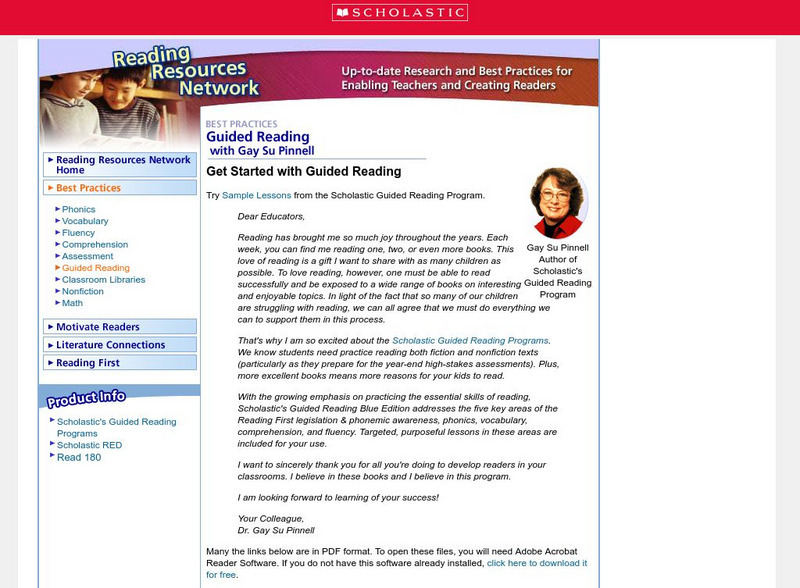Other
Warren County Schools: Citing Textual Evidence
Well-organized and in-depth lesson on citing textual evidence and understanding inferences. Many examples are included, as well as exercises for the students to practice what they have learned. [PDF]
National Endowment for the Humanities
Neh: Edsit Ement: Fable and Trickster Tales Around the World
The lessons presented in this website "introduce children to folk tales" and how these folktales are changed and affected by generational and cultural values. Includes several links to further related information on folktales, fables,...
AdLit
Ad lit.org: Classroom Strategies: Inferential Reading
Teaching students to "read influentially" helps them learn how to read more strategically. This technique is derived from the teaching model that learners develop knowledge via the process of interpreting new information in light of past...
Scholastic
Scholastic: Getting Started With Guided Reading
How do you get started with guided reading? At this site one can find the answer to this question. The online lesson plans will help get students started with guided reading.
PBS
Pbs: Multiple Methods of Reading Instruction
This article surveys three strategies to incorporate into classroom repertoire. They include guided reading, choral reading, and readers' theater.
Polk Brothers Foundation Center for Urban Education at DePaul University
De Paul University: Center for Urban Education: Lincoln's Choice [Pdf]
"Lincoln's Choice" is a one page, fictional, reading passage about young Abraham Lincoln saving a friend from drowning. It is followed by constructed-response questions which require students to provide evidence from the story; it...
Polk Brothers Foundation Center for Urban Education at DePaul University
De Paul University: Center for Urban Education: My Summer [Pdf]
"My Summer" is a one page, fictional, reading passage about a child who visited his grandmother in Phoenix for the summer. He was surprised at how hot it was there. It is followed by open-ended questions which require students to provide...
Polk Brothers Foundation Center for Urban Education at DePaul University
De Paul University: Center for Urban Education: See Our Progress [Pdf]
"See Our Progress" is a one page, fictional, reading passage about students who turned a vacant lot into a prairie garden and then were interviewed and shown on the television news. It is followed by questions which require students to...
Polk Brothers Foundation Center for Urban Education at DePaul University
De Paul University: Center for Urban Education: Chicago High Schools [Pdf]
"Chicago High Schools" is a one page, nonfiction, reading passage about high schools in Chicago including specialty high schools and the basic requirements for all high schools. It is followed by constructed-response questions which...
Polk Brothers Foundation Center for Urban Education at DePaul University
De Paul University: Center for Urban Education: Harold Washington's Speech [Pdf]
"Harold Washington's Acceptance Speech" is a one page, excerpt from a speech given by Harold Washington after being elected as mayor of Chicago on April 12, 1983. It is followed by constructed-response questions which require students to...
Curated OER
Mc Graw Hill: Use Details and Examples
Review how to use text evidence, details, examples, and personal experiences to make inferences then read a passage to practice on your own.
Polk Brothers Foundation Center for Urban Education at DePaul University
De Paul University: Center for Urban Education: I Can Identify and Infer Character Traits[pdf]
Students will identify character traits directly and inferentially with the help of this graphic organizer. Students will summarize their findings after completing the graphic organizer.
Polk Brothers Foundation Center for Urban Education at DePaul University
De Paul University: Center for Urban Education: I Can Infer Character Traits and Support [Pdf]
Students can use this graphic organizer while making inferences about characters in a story or history text. Students will collect text evidence in the chart to support their character trait inferences.
Polk Brothers Foundation Center for Urban Education at DePaul University
De Paul University: Center for Urban Education: Expand Story or History Text Based Dialog[pdf]
Students will use graphic organizers to help them make inferences about historical figures' feeings and motives. Students will summarize the information during an extension activity.
Curated OER
Mc Graw Hill: Part 1 Reading: Literature: 5th Grade Quote Accurately
An article describing the importance of making inferences while reading a story.
Curated OER
Mc Graw Hill: 4th Grade Use Details and Examples
This reference from the McGraw-Hill CCCS Literacy eHandbook discusses the importance of recalling explicit details. The importance of inferencing skills with a how-to graphic organizer for making inferences are included. Students may...
Polk Brothers Foundation Center for Urban Education at DePaul University
De Paul University: Center for Urban Education: Identify/infer Character Traits [Pdf]
This page contains links for three graphic organizers. Students will use graphic organizers to identify character traits, infer character traits, and support inferences with text evidence.
Polk Brothers Foundation Center for Urban Education at DePaul University
De Paul University: Center for Urban Education: I Can Classify and Infer When I Read [Pdf]
This site contains links to two graphic organizers to guide and assess the understanding of nonfiction text in science and social studies.
Polk Brothers Foundation Center for Urban Education at DePaul University
Depaul University: Center for Urban Education: Make/explain an Inference [Pdf]
In this learning module, students will find links to five graphic organizers. Students will be able to use the resources to help them make inferences...
PBS
Pbs Teachers: Dead Men's Tales: Splatter Spread
Emulate the work of a forensic scientist by observing the relationship between scatter and distance. Assemble a projectile-hurling device called a potato cannon and analyze the spread pattern of paint soaked projectiles.
Austin Independent School District
Austin Independent School: 10 Major Types of Inference in Literature [Pdf]
This printable worksheet helps students recognize the difference between an implication and an inference. Students are presented with quotes from the text and they practice with each of the ten types of inference: location, agent, time,...
Reading Rockets
Reading Rockets: Strategy Guide: Teaching How Scientists Make Inferences [Pdf]
This guide includes an introductory section about visual evidence, a general overview of how to use this strategy with many science texts, and a plan for teaching how to use visual evidence to make inferences with the Seeds of...
E Reading Worksheets
E Reading Worksheets: Implicit Character Traits Worksheet
In this learning module, students will practice making inferences about character traits. A worksheet is provided to practice with finding implicit character traits. This module is designed to support Tier I, Tier II, and Tier III students.










![De Paul University: Center for Urban Education: Identify/infer Character Traits [Pdf] Graphic De Paul University: Center for Urban Education: Identify/infer Character Traits [Pdf] Graphic](https://content.lessonplanet.com/knovation/original/119983-62ee3880b7ac71dbc7bc636a19f336da.jpg?1661787060)
![De Paul University: Center for Urban Education: I Can Classify and Infer When I Read [Pdf] Unit Plan De Paul University: Center for Urban Education: I Can Classify and Infer When I Read [Pdf] Unit Plan](https://content.lessonplanet.com/knovation/original/119984-1e8c3bd778b0e773bd6dcdc545a348e7.jpg?1661787061)
![Depaul University: Center for Urban Education: Make/explain an Inference [Pdf] Unit Plan Depaul University: Center for Urban Education: Make/explain an Inference [Pdf] Unit Plan](https://content.lessonplanet.com/knovation/original/119992-7c63190421a93785b60f68e563caa7db.jpg?1661787072)
